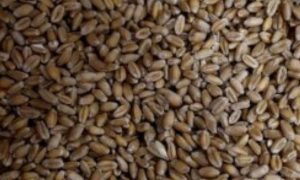Wheat futures take breather as traders pull back from war-fueled rally

U.S. wheat futures fell 2.8% on Monday, reversing last week’s 5% rally driven by fears of Black Sea supply disruptions following a Russian missile strike. China’s report of a 5.4% reduction in its sow herd also weighed on markets, suggesting lower feed grain demand. December wheat closed at $5.78 per bushel, marking a six-week low.
U.S. wheat futures fell Monday by the most in six weeks, as traders took profits after prices rose last week from escalated hostilities in the Russia-Ukraine war.
Wheat jumped 5% to nearly $6 per bushel last week, hitting the highest in more than two months on Friday, after Ukraine said a Russian missile had hit a grain ship in the Black Sea.
“The rally is overdone as it was just based on fears of Black Sea supply disruption,” Ikon Commodities CEO Ole Houe told Bloomberg.
Also pressuring CBOT grains Monday was China’s agricultural ministry weekend report of a 5.4% reduction in its sow herd, Dow Jones reported.
“[It’s] indicating feed grain demand will fall as we will see fewer pigs born,” Karl Setzer of Consus Ag Consulting said, adding that slowing growth in Chinese demand also indicates its export demand for grains may slow.
CBOT wheat (W_1:COM) for December delivery settled -2.8% to $5.78 per bushel after falling as much as 3.5%, the biggest intraday decline since August 5, while corn (C_1:COM) for December delivery closed -0.7% to $4.10 1/2 per bushel, and November soybeans (S_1:COM) ended -0.2% to $10.04 per bushel.
ETFs: (NYSEARCA:WEAT), (NYSEARCA:CORN), (NYSEARCA:SOYB), (DBA), (MOO) is now facing
Iraq’s Wheat Surplus Poses Major Challenge Amid Falling Oil Prices
Argentina, the world’s biggest exporter of processed soybean meal and oil, is set to buy soybeans from the U.S. for the first since 2019, as declining American prices make them the cheapest in the world.
Argentina has purchased 88,400 metric tons of beans to be shipped during the current season, the U.S. Department of Agriculture reported, coming as the harvest of a record U.S. crop gets underway.
Also, the National Oilseed Processors Association reported the U.S. soybean crush rate for August at a rate of 158M bushels/acre, well below analyst expectations above 170M bushels/acre, AgResource said, according to Dow Jones.

















